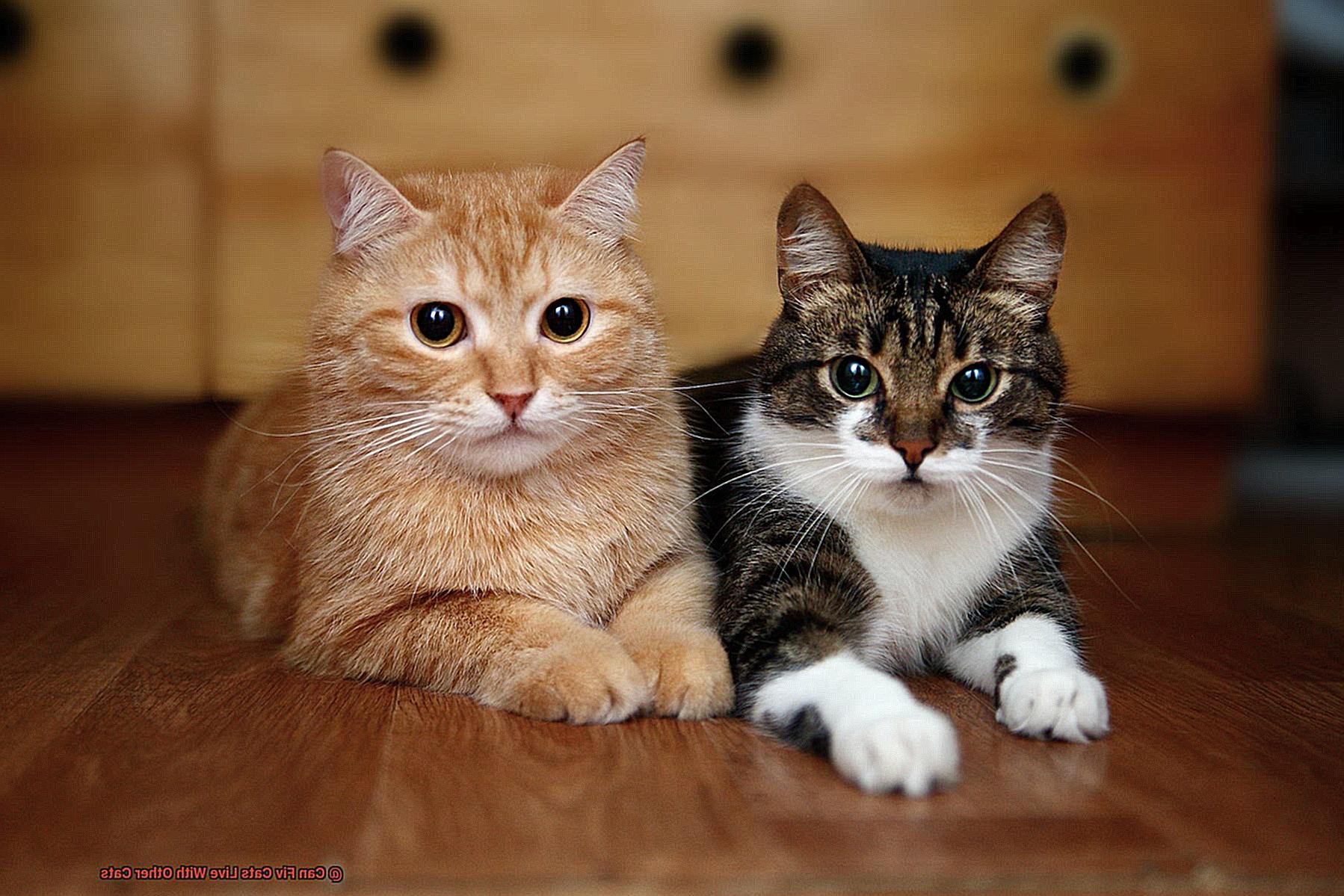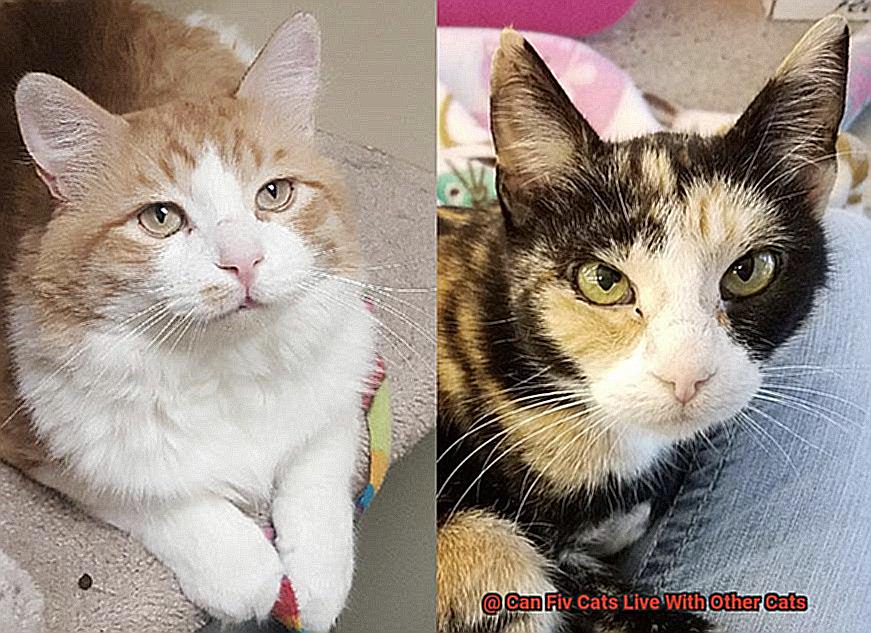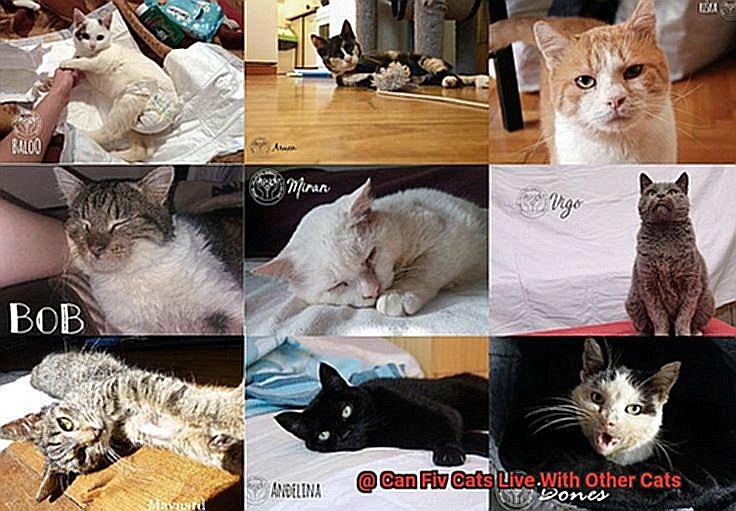Are you considering adding a FIV positive cat to your household with other feline companions? It’s a difficult decision to make, as Feline Immunodeficiency Virus (FIV) can weaken a cat’s immune system, making them more susceptible to infections and illnesses. However, every cat has their own unique personality, and some may be more accepting of new housemates than others.
Experts in the feline world have shed some light on whether or not FIV positive cats can coexist with other cats. While it’s true that uninfected cats can contract the virus through prolonged close contact with infected cats, transmission of the virus primarily occurs through deep bite wounds. This means that FIV positive cats who don’t exhibit aggressive behavior are less likely to infect their fellow felines.
It’s crucial to remember that any cat with a compromised immune system is at higher risk for illness and disease. Therefore, introducing an FIV positive cat into a home with other cats requires extra precautions. In this article, we’ll delve into the question of whether or not FIV cats can live with other cats and provide helpful tips for making the transition as smooth as possible for both your furry friends and you.
What is FIV?
Feline Immunodeficiency Virus (FIV) is a viral infection that affects cats, and it’s often compared to the human immunodeficiency virus (HIV) because they both attack the immune system. This virus weakens cats’ immune systems, leaving them more susceptible to infections and diseases. FIV is typically transmitted through the exchange of bodily fluids such as saliva, blood, and urine, and it’s most commonly spread through bite wounds from an infected cat.
It’s important to know that FIV is only contagious between cats and cannot be transmitted to humans or other animals. The symptoms of FIV can take years to develop, and some infected cats may never show any symptoms at all. However, common signs of FIV include recurring infections, weight loss, and lethargy. Cats with FIV may also have dental problems and skin issues.
Although there is no cure for FIV, infected cats can still lead long and healthy lives with proper care and management. It’s crucial to keep them indoors to reduce the risk of spreading the virus to other cats through fighting or mating. Infected cats should also receive regular veterinary check-ups and vaccinations to prevent secondary infections.
One question that many cat owners ask is whether FIV-positive cats can live with other cats. The answer is not straightforward and depends on various factors such as the health status of the other cats, the personality of the cats, and the living environment.

Research has shown that FIV-positive cats can live with other cats without transmitting the virus if the other cats are also FIV-positive. However, if the other cats are not infected with FIV, there is a risk of transmission through bites during fights or mating.
Therefore, it’s recommended not to introduce an FIV-positive cat into a household with healthy cats unless they have been previously exposed to the virus or have immunity. It’s also important to monitor the cats’ behavior and health closely to ensure that they are not in distress or showing signs of illness.
How is FIV Transmitted?
To do so, it’s crucial to understand how Feline Immunodeficiency Virus (FIV) is transmitted.
FIV is a contagious virus that is similar to HIV in humans. It’s spread through the exchange of bodily fluids like blood, saliva, and urine during fights or mating. Additionally, mother cats can pass the virus to their kittens during birth or nursing.
It’s important to note that FIV is not easily transmitted through casual contact between cats, such as sharing food bowls or litter boxes. The virus requires direct contact with bodily fluids to be transmitted and cannot survive outside the cat’s body for long periods of time.
If your cat has been diagnosed with FIV, it’s crucial to keep them separated from other cats to prevent the spread of the virus. However, in certain circumstances, FIV-positive cats can live with other cats without transmitting the virus. For example, if all cats in a household are already infected with FIV, there is no risk of transmission, and they can live together without issue. Similarly, if an FIV-positive cat has a robust immune system and receives proper veterinary care, they may be able to live with non-infected cats without transmitting the virus.
Nevertheless, introducing an FIV-positive cat to other cats should always be done with caution and under the guidance of a veterinarian. By taking precautions and managing your cat’s health closely, you can ensure the safety and well-being of all your feline companions.
Can FIV-Positive Cats Live with Other Cats?
Don’t worry, it’s possible for these cats to live with other feline companions, as long as you take the necessary steps to ensure their health and safety.
Feline Immunodeficiency Virus (FIV) weakens a cat’s immune system and is typically spread through bites from infected cats. However, it’s essential to note that FIV is not easily transmitted between cats through casual contact.
To ensure a harmonious living environment for all of your furry friends, there are several precautions that you should take. First, it’s crucial to get all of the cats in your household tested for FIV before introducing a new cat. By identifying any potentially infected cats, you can take the necessary steps to safeguard everyone’s well-being.
Separate food and water bowls, as well as litter boxes, should be provided for each cat in the household. This will prevent the spread of the virus through sharing of these items. Additionally, keeping FIV-positive cats indoors will prevent them from potentially fighting with other cats outside and spreading the virus.
It’s important to note that if your FIV-positive cat is not aggressive towards other cats and does not engage in fights, there is a low risk of transmission. However, if you notice any concerning behavior, seek guidance from your veterinarian.
Factors to Consider When Housing FIV-Positive Cats with Other Cats
When it comes to housing FIV-positive cats with other feline friends, there are several factors to consider to ensure a harmonious and healthy living environment. FIV, or Feline Immunodeficiency Virus, is primarily spread through deep bite wounds, so it’s important to keep infected cats separated from non-infected ones to prevent the spread of other illnesses that can be harmful to FIV-positive cats.
Aside from the virus transmission risk, we also need to factor in the cats’ personalities. Does the FIV-positive cat have an aggressive or dominant temperament? If so, it may pose a risk to other cats in the household. On the other hand, if the FIV-positive cat is docile and submissive, it may be at risk of being bullied by other felines. Observing and assessing the behavior of all cats before making any decisions about their housing arrangements is crucial.
Age and health status are also important considerations when planning to house FIV-positive cats with other felines. If a FIV-positive cat is elderly or has other health issues, it may not be able to defend itself against other cats in the household. Similarly, if a non-infected cat is very young or has a compromised immune system, it may not be able to fight off illnesses as effectively and could be more vulnerable to contracting FIV.
To avoid sharing bodily fluids, it’s best to provide separate food bowls, litter boxes, and sleeping areas for FIV-positive and non-infected cats when they live together. Regular veterinary check-ups for both infected and non-infected cats are also crucial to monitor their health and catch any potential illnesses early on.
0YsQ1PV2Itw” >
Tips for Introducing an FIV-Positive Cat into a Household with Healthy Cats
Introducing a new cat into your household can be a challenging task, especially when one of them is FIV-positive. However, with proper planning and patience, it is possible to successfully integrate the cats. Here are five comprehensive tips to help ease the process:
Consult with Your Veterinarian
Before introducing the FIV-positive cat to your household, consult with your veterinarian. They can provide advice on how to manage and prevent the spread of the virus, as well as necessary precautions you should take. By having an expert’s guidance and support, you can ensure that you are doing everything within your power to keep all your cats safe and healthy.
Isolate the New Cat
It is important to keep the FIV-positive cat separated from other cats in the household for at least two weeks. This will allow time for the new cat to adjust and for you to monitor their health. Providing them with their own litter box, food, and water bowls in a separate room will give them time to settle in.
Introduce Scents

After two weeks, begin introducing scents from each cat to the other. This can be done by rubbing a towel or cloth on one cat and then placing it near the other cat’s food or bedding. By doing so, you are allowing each cat to become familiar with each other’s scent before they meet face-to-face.
Gradual Exposure

Once both cats seem comfortable with each other’s scent, you can begin supervised interactions. This means keeping them in separate rooms but allowing them to see each other through a baby gate or crack in the door. Over time, gradually increase the amount of time the cats spend together while supervised. This will help them get used to each other’s presence without overwhelming either one.
Monitor for Signs of Stress or Illness
Throughout the introduction process, monitor both cats for any signs of stress or illness. If either cat seems uncomfortable or exhibits any symptoms of illness, separate them immediately and consult with your veterinarian. Remember that each cat is unique, and some may take longer to adjust than others. With patience, proper care, and attention, your cats can live harmoniously together.
Also Read: What Is Fiv Positive In Cats?
Conclusion
In summary, the question of whether FIV cats can live with other cats is a complex one. While it’s possible for FIV-positive cats to coexist with other felines without transmitting the virus, introducing them into a home with uninfected cats requires extra care and attention. It’s important to remember that any cat with a weakened immune system is more susceptible to illness and disease.
To ensure a peaceful living environment for all your furry friends, there are several factors to consider. You should take into account each cat’s health status, personality, age, and living environment. Additionally, providing separate food bowls, litter boxes, and sleeping areas for FIV-positive and non-infected cats can help prevent the spread of the virus.
If you’re thinking about adding an FIV-positive cat to your household with other feline companions, it’s crucial to consult with your veterinarian first. They can offer advice on how to manage and prevent the spread of the virus as well as necessary precautions you should take. By following these tips and taking proper care of your furry friends’ health, you can ensure a smooth transition and happy coexistence between all your beloved cats.







